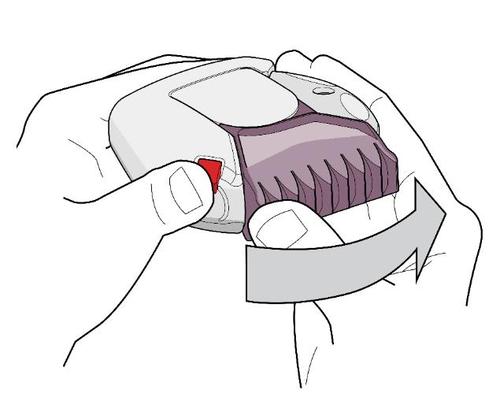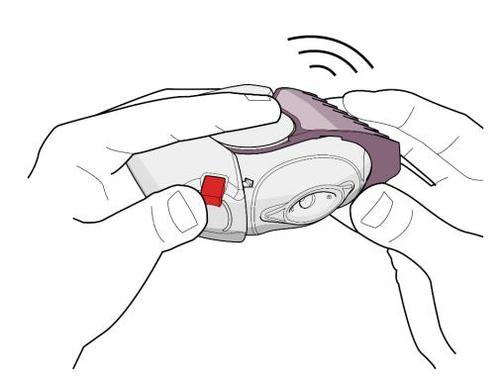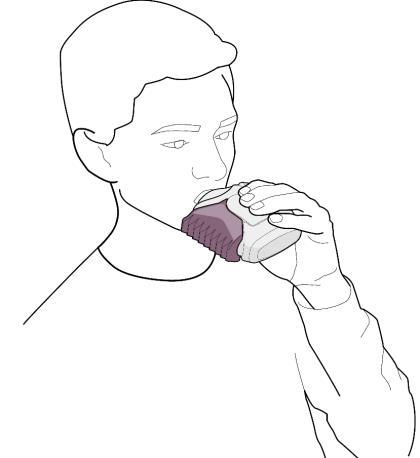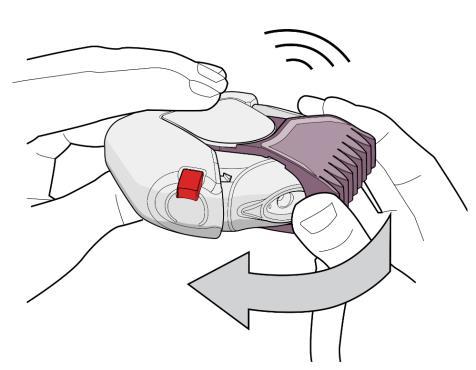
Neuair Airmaster
Ask a doctor about a prescription for Neuair Airmaster

How to use Neuair Airmaster
Leaflet accompanying the packaging: patient information
Neuair Airmaster, (50 micrograms + 500 micrograms)/dose, inhalation powder,
divided
Salmeterol + Fluticasone propionate
You should carefully read the contents of the leaflet before using the medicine, as it contains important information for the patient.
- You should keep this leaflet so that you can read it again if you need to.
- In case of any doubts, you should consult a doctor, pharmacist, or nurse.
- This medicine has been prescribed specifically for you. Do not pass it on to others. The medicine may harm another person, even if their symptoms are the same.
- If the patient experiences any side effects, including any side effects not listed in this leaflet, they should tell their doctor, pharmacist, or nurse. See section 4.
Table of contents of the leaflet
- 1. What is Neuair Airmaster and what is it used for
- 2. Important information before using Neuair Airmaster
- 3. How to use Neuair Airmaster
- 4. Possible side effects
- 5. How to store Neuair Airmaster
- 6. Contents of the packaging and other information
1. What is Neuair Airmaster and what is it used for
Neuair Airmaster contains two active substances: salmeterol and fluticasone propionate.
- Salmeterol is a long-acting bronchodilator. Bronchodilators help to keep the airways open, making it easier for air to get in and out of the lungs. The effect lasts for at least 12 hours.
- Fluticasone propionate is a corticosteroid that reduces inflammation and swelling in the lungs.
Neuair Airmaster is used to treat adults and adolescents aged 12 years and older.
The doctor has prescribed this medicine to the patient to prevent breathing problems that occur in:
- asthma, or
- chronic obstructive pulmonary disease (COPD). Neuair Airmaster, at a dose of 50 micrograms + 500 micrograms, reduces the number of exacerbations of COPD symptoms.
In order to ensure proper control of asthma or COPD, Neuair Airmaster must be used every day as recommended by the doctor.
Neuair Airmaster prevents shortness of breath and wheezing in the airways. However, it should not be used to control sudden attacks of shortness of breath or wheezing in the airways. If such an attack occurs, it is necessary to use a fast-acting bronchodilator, such as salbutamol, immediately.
The patient should always carry such a medicine with them.
2. Important information before using Neuair Airmaster
When not to use Neuair Airmaster
- if the patient is allergic to salmeterol, fluticasone propionate, or lactose monohydrate, an excipient of the medicine.
Warnings and precautions
Before starting to use Neuair Airmaster, the patient should talk to their doctor, pharmacist, or nurse if they have:
- heart disease, including irregular or rapid heartbeat,
- hyperthyroidism,
- high blood pressure,
- diabetes (Neuair Airmaster may increase blood glucose levels),
- low potassium levels in the blood,
- tuberculosis currently being treated or previously treated or other lung infections.
If the patient experiences blurred vision or other vision disturbances, they should contact their doctor.
Children
This medicine should not be used in children under 12 years of age.
Neuair Airmaster and other medicines
The patient should tell their doctor about all medicines they are currently taking or have recently taken, as well as any medicines they plan to take. Neuair Airmaster should not be used with certain medicines.
Before starting to use Neuair Airmaster, the patient should inform their doctor about taking the following medicines:
- Beta-adrenergic blockers (e.g., atenolol, propranolol, and sotalol). Beta-adrenergic blockers are most commonly used to treat high blood pressure or other heart diseases, such as angina pectoris.
- Medicines used to treat infections (e.g., ketoconazole, itraconazole, and erythromycin), including some medicines used to treat HIV (e.g., ritonavir, cobicistat-containing medicines). Some of these medicines may increase the levels of fluticasone propionate or salmeterol in the body. This may increase the risk of side effects of Neuair Airmaster, including irregular heartbeat, or may worsen existing side effects. The doctor may want to closely monitor the patient's condition when taking such medicines.
- Corticosteroids (orally or by injection). If the patient has recently taken such medicines, it may increase the risk of adrenal gland disorders caused by Neuair Airmaster.
- Diuretics used to treat high blood pressure.
- Other bronchodilators (such as salbutamol).
- Medicines containing xanthine derivatives, such as aminophylline and theophylline, often used to treat asthma.
Pregnancy and breastfeeding
If the patient is pregnant or breastfeeding, thinks they may be pregnant, or plans to have a baby, they should consult their doctor before using this medicine.
Driving and using machines
It is unlikely that Neuair Airmaster will affect the ability to drive or use machines.
Neuair Airmaster contains lactose
Neuair Airmaster contains approximately 13 milligrams of lactose monohydrate per dose. The amount of lactose in this medicine usually does not cause problems for people with lactose intolerance. The excipient lactose contains small amounts of milk proteins, which may cause allergic reactions.
3. How to use Neuair Airmaster
This medicine should always be used as recommended by the doctor. In case of doubts, the patient should consult their doctor or pharmacist.
- Neuair Airmaster should be used every day, unless the doctor recommends otherwise. The patient should not take a higher dose than recommended. In case of doubts, the patient should consult their doctor or pharmacist.
- The patient should not stop using Neuair Airmaster or reduce the dose without consulting their doctor.
- Neuair Airmaster should be inhaled into the lungs through the mouth.
Recommended dose
Asthma
Adults and adolescents aged 12 years and older
- Neuair Airmaster, (50 micrograms + 500 micrograms)/dose: one inhalation twice a day.
Adults with chronic obstructive pulmonary disease (COPD)
- Neuair Airmaster, (50 micrograms + 500 micrograms)/dose: one inhalation twice a day.
If the symptoms of asthma are well-controlled while using Neuair Airmaster twice a day, the doctor may recommend reducing the frequency of using Neuair Airmaster to once a day. The dose can be given:
- once a day, in the evening, if the patient's symptoms occur at night,
- once a day, in the morning, if the patient's symptoms occur during the day. It is very important that the doctor instructs the patient on how many inhalations and how often to use.
If the patient is using Neuair Airmaster for asthma, the doctor will regularly check the symptoms.
In case of worsening asthma symptoms or breathing difficulties, the patient should immediately contact their doctor.
The patient should continue using Neuair Airmaster, but should not increase the number of inhalations. The symptoms of the disease may worsen, and the patient's condition may deteriorate. The patient should contact their doctor, as they may need additional treatment.
Instructions for use
- Neuair Airmaster may differ from inhalers used by the patient in the past, so it is very important to use it correctly. The doctor, nurse, or pharmacist should instruct the patient on how to use the inhaler properly.


Fig. 1
Fig. 2
Note: Each time the mouthpiece cover is opened after the "click", a blister opens inside, and the next dose of powder is ready for inhalation. Therefore, the mouthpiece cover should not be opened unless the medicine is to be taken, as the next blister will open, and the medicine will be wasted.
- 2. The inhaler should be held at a distance from the mouth and a slow, deep exhalation should be performed. The patient should not exhale into the inhaler.
- 3. The mouthpiece should be placed in the mouth (see Fig. 3). A deep inhalation should be performed from the inhaler through the mouth, not through the nose. The inhaler should be removed from the mouth. The breath should be held for about 10 seconds or as long as it is comfortable. A slow exhalation should be performed.

Fig. 3
The inhaler delivers a dose of medicine in the form of a very fine powder. The patient may, but does not have to, feel the powder. The patient should not take an additional dose from the inhaler if they do not feel the taste of the medicine.
- 4. The inhaler should be closed to keep it clean by turning the purple (for 50/500 micrograms) mouthpiece cover back to its original position - until it clicks (see Fig. 4). The patient will hear a "click". The mouthpiece cover has now been returned to its original position. The inhaler is now ready for use at the next scheduled dose.
- 5. After inhaling the medicine, the patient should rinse their mouth with water and spit it out and (or) brush their teeth. This may help prevent hoarseness and thrush.

Fig. 4
Cleaning the inhaler
The inhaler should be kept dry and clean.
In case of need, the mouthpiece of the inhaler can be wiped with a dry cloth or tissue.
Using a higher dose of Neuair Airmaster than recommended
It is important to use the inhaler as instructed. In case of accidental use of a higher dose than recommended, the patient should tell their doctor or pharmacist. The following may occur: faster than usual heartbeat, tremors, dizziness, headache, weakness, and joint pain.
In case of using higher doses for a long time, the patient should contact their doctor or pharmacist for advice, as high doses of Neuair Airmaster may cause a decrease in the production of steroid hormones by the adrenal glands.
Missing a dose of Neuair Airmaster
The patient should not take a double dose of the medicine to make up for a missed dose. The next dose should be taken at the scheduled time.
Stopping the use of Neuair Airmaster
It is very important to take Neuair Airmaster every day as recommended by the doctor. The patient should take the medicine until the doctor recommends stopping it. The patient should not suddenly stop taking Neuair Airmaster or reduce the dose, as the symptoms of the disease may worsen.
Additionally, sudden stopping or reduction of the dose of Neuair Airmaster may (very rarely) cause adrenal gland disorders (adrenal insufficiency), which can sometimes cause side effects.
These side effects may include:
- abdominal pain,
- fatigue and loss of appetite, nausea,
- vomiting and diarrhea,
- weight loss,
- headache and drowsiness,
- low blood sugar,
- low blood pressure and seizures.
If the patient experiences any of these side effects, they should tell their doctor or pharmacist. To prevent these symptoms, the doctor may prescribe additional corticosteroids in the form of tablets (e.g., prednisolone).
4. Possible side effects
Like all medicines, this medicine can cause side effects, although not everybody gets them.
To minimize the risk of side effects, the doctor will recommend the smallest dose of this medicine that will control asthma or COPD.
Allergic reactions: The patient may experience sudden breathing difficulties immediately after using Neuair Airmaster
The patient should stop using Neuair Airmaster and contact their doctor immediately. The patient may experience worsening wheezing, coughing, or shortness of breath, as well as itching, rash (hives), and swelling (usually of the face, lips, tongue, or throat). The patient may also experience a very fast heartbeat, weakness, and dizziness (which can lead to falls or loss of consciousness). In case of any of these symptoms, the patient should stop using Neuair Airmaster and contact their doctor immediately. Allergic reactions to Neuair Airmaster are uncommon (may occur less often than in 1 in 100 people).
Pneumonia (lung infection) in patients with chronic obstructive pulmonary disease (COPD) (common side effect)
The patient should tell their doctorif they experience any of the following symptoms - these may be symptoms of a lung infection:
- Fever or chills.
- Increased production of mucus, change in the color of mucus.
- Worsening cough or increased breathing difficulties.
Other side effects:
Very common side effects (may occur more often than in 1 in 10 people)
- Headache - this side effect usually decreases over time while continuing treatment.
- Increased frequency of colds in patients with chronic obstructive pulmonary disease (COPD) has been reported.
Common side effects (may occur less often than in 1 in 10 people)
- Thrush (painful, creamy-white patches) in the mouth and throat, as well as sore tongue, hoarseness, and throat irritation. Rinsing the mouth with water and spitting it out and (or) brushing the teeth after each inhalation may be helpful. The doctor may recommend an antifungal medicine to treat thrush.
- Pain, swelling of the joints, and muscle pain.
- Muscle cramps.
The following side effects have been reported in patients with chronic obstructive pulmonary disease (COPD):
- Easier bruising and fractures.
- Sinusitis (feeling of tension and fullness in the nose, cheeks, and behind the eyes, sometimes with a pulsating headache).
- Decreased potassium levels in the blood (the patient may experience irregular heartbeat, muscle weakness, or cramps).
Uncommon side effects (may occur less often than in 1 in 100 people)
- Increased blood sugar (glucose) levels (hyperglycemia). In patients with diabetes, it may be necessary to monitor blood sugar levels more frequently and adjust the dose of antidiabetic medicines.
- Cataract (clouding of the lens of the eye).
- Very fast heartbeat (tachycardia).
- Feeling of trembling and fast or irregular heartbeat (palpitations) - these symptoms usually are not serious and decrease over time while continuing treatment.
- Chest pain.
- Restlessness (this symptom occurs mainly in children).
- Sleep disturbances.
- Allergic skin rash.
Rare side effects (may occur less often than in 1 in 1000 people)
- Breathing difficulties or wheezing worsening immediately after using Neuair Airmaster. In case of such symptoms, the patient should stop using Neuair Airmaster, use a fast-acting inhaled bronchodilator, and contact their doctor immediately.
- Neuair Airmaster may disrupt the normal production of steroid hormones by the body, especially when taking high doses of the medicine for a long time. These symptoms include:
- slowed growth in children and adolescents,
- decreased bone density,
- glaucoma,
- weight gain,
- rounding (moon-shaped) face (Cushing's syndrome). The doctor will regularly check if the patient is experiencing such side effects and ensure that the patient is using the smallest dose of this medicine that controls asthma.
- Changes in behavior, such as excessive excitement and irritability (these symptoms occur mainly in children).
- Irregular, irregular heartbeat or extra beats (heart rhythm disturbances). The patient should inform their doctor about this, but should not stop using Neuair Airmaster unless the doctor recommends it.
- Fungal infection of the esophagus, which can cause difficulty swallowing.
Side effects with unknown frequency (frequency cannot be estimated from available data)
- Depression or aggression (the occurrence of these side effects is more likely in children).
- Blurred vision.
Reporting side effects
If the patient experiences any side effects, including any side effects not listed in the leaflet, they should tell their doctor or pharmacist. Side effects can be reported directly to the Department of Drug Safety Monitoring of the Office for Registration of Medicinal Products, Medical Devices, and Biocidal Products:
Al. Jerozolimskie 181C, 02-222 Warsaw, tel.: 22 49-21-301, fax: 22 49-21-309,
Website: https://smz.ezdrowie.gov.pl
Side effects can also be reported to the marketing authorization holder.
By reporting side effects, more information can be collected on the safety of the medicine.
5. How to store Neuair Airmaster
- •The medicine should be stored out of sight and reach of children.
- The medicine should not be used after the expiry date stated on the carton and inhaler label after: EXP. The expiry date (EXP) means the last day of the given month.
- The medicine should not be stored at temperatures above 30°C.
- Medicines should not be disposed of via wastewater or household waste. The patient should ask their pharmacist how to dispose of medicines that are no longer needed. This will help protect the environment.
6. Contents of the packaging and other information
What Neuair Airmaster contains
The active substances of the medicine are salmeterol and fluticasone propionate.
Each single inhalation provides a dose (dose leaving the mouthpiece) of 43 micrograms of salmeterol (as salmeterol xinafoate) and 432 micrograms of fluticasone propionate. This is equivalent to a dose of 50 micrograms of salmeterol (as salmeterol xinafoate) and 500 micrograms of fluticasone propionate.
The other ingredient is lactose monohydrate (see section 2 under "Neuair Airmaster contains lactose") (which contains milk proteins).
What Neuair Airmaster looks like and contents of the pack
- Neuair Airmaster contains a strip of foil with blisters filled with white or off-white powder. The foil protects the inhalation powder from environmental conditions.
- Each dose is divided.
- The white plastic parts with a purple (for 50/500 micrograms) mouthpiece are packaged in cardboard boxes, which contain: 1, 2, 3, or 10 inhalers, each containing 60 doses of powder.
Not all pack sizes may be marketed.
Marketing authorization holder
Neutec Inhaler Ireland Limited
22 Northumberland Road,
Ballsbridge,
Dublin 4,
Ireland
Manufacturer/Importer
Oy Medfiles, Ltd.
Volttikatu 5, Volttikatu 8
Kuopio, 70700
Finland
This medicinal product is authorized in the Member States of the European Economic Area under the following names:
Sweden
Neuair Airmaster
Austria
Neuair Airmaster
Belgium
Brecur Airmaster 50 microgram/500 microgram/dose, inhalation powder, pre-dispensed
Brecur Airmaster 50 micrograms/500 micrograms/dose, powder for inhalation in a single-dose container
Brecur Airmaster 50 Mikrogramm/500 Mikrogramm single-dose powder for inhalation
Bulgaria
Еверио Еърмастър 50 микрограма/500 микрограма/доза прах за инхалация, предварително дозиран
Czech Republic
Everio Airmaster
Estonia
Everio Airmaster
France
PROPIONATE DE FLUTICASONE/SALMETEROL ZENTIVA 500 micrograms/50 micrograms/dose, powder for inhalation in a single-dose container
Spain
Salmeterol/Fluticasona Zentiva 50 micrograms/500 micrograms/inhalation, powder for inhalation (single dose)
Ireland
Bronx Airmaster
Lithuania
Everio Airmaster 50/500 mikrogramų/dozėje inhalation powder, pre-dispensed
Latvia
Everio Airmaster 50/500 mikrogrami/devā inhalācijas pulveris, dozēts
Poland
Neuair Airmaster
Romania
Everio Airmaster 50 micrograme/500 micrograme pulbere de inhalat unidoza
Slovakia
Everio Airmaster 50 mikrogramov/500 mikrogramov
Hungary
Fluzalto Airmaster 50 mikrogramm/500 mikrogramm/adag adagolt inhalációs por
Date of last revision of the leaflet: 2021/11
- Country of registration
- Active substance
- Prescription requiredYes
- ImporterOy Medfiles Ltd. Oy Medfiles Ltd.
- This information is for reference only and does not constitute medical advice. Always consult a licensed doctor before taking any medication. Oladoctor is not responsible for medical decisions based on this content.
- Alternatives to Neuair AirmasterDosage form: Powder, 50 mcg + 250 mcgActive substance: salmeterol and fluticasoneManufacturer: Aeropharm GmbHPrescription requiredDosage form: Powder, 50 mcg + 500 mcgActive substance: salmeterol and fluticasoneManufacturer: Aeropharm GmbHPrescription requiredDosage form: Powder, (50 micrograms + 500 micrograms)/doseActive substance: salmeterol and fluticasonePrescription required
Alternatives to Neuair Airmaster in other countries
The best alternatives with the same active ingredient and therapeutic effect.
Alternative to Neuair Airmaster in Spain
Alternative to Neuair Airmaster in Ukraine
Online doctors for Neuair Airmaster
Discuss dosage, side effects, interactions, contraindications, and prescription renewal for Neuair Airmaster – subject to medical assessment and local rules.














